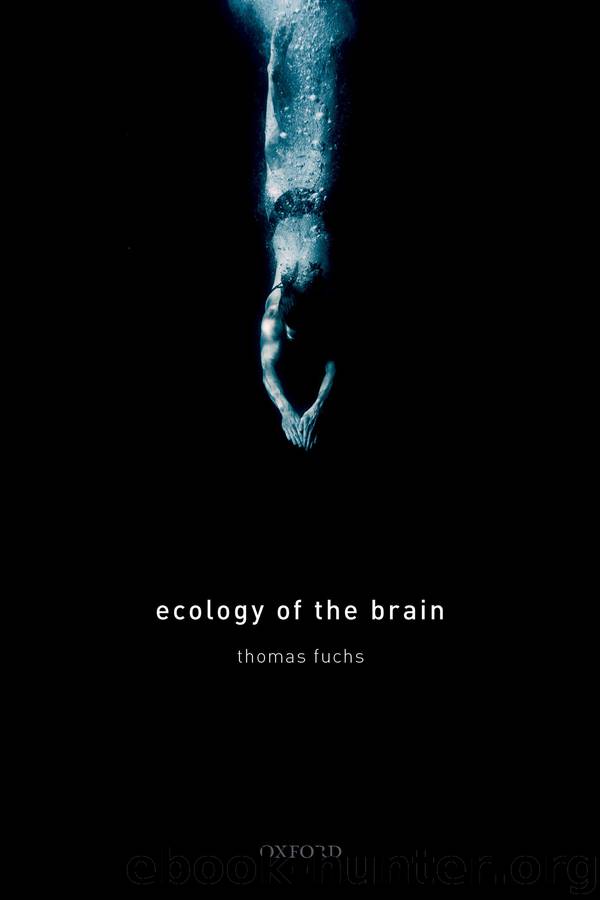Ecology of the Brain by Fuchs Thomas;

Author:Fuchs, Thomas;
Language: eng
Format: epub
Publisher: Oxford University Press, Incorporated
Published: 2018-04-15T00:00:00+00:00
1 Consequently, cognition is no longer seen as problem solving on the basis of representations; instead, cognition in its most encompassing sense consists in the enactment or bringing forth of a world by a viable history of structural coupling” (Varela et al. 1991, 205).
2 Most human psychological research, including cognitive and social sciences, typically focuses on the highest levels, commonly with little recognition of the lower levels” (Panksepp 2012, 10). The prevalence of functionalist and computational theories of the mind has favored the location of consciousness at the top of the brain, while neglecting its vital and affective basis. Typically enough, the embedding of brain functions in complex biochemical, humoral, and endocrine processes taking place in liquor and blood was regarded as cognitively irrelevant. Connectionist researchers built artificial neural networks that ignored the fact that signals in real brains constantly change from chemical to electrical and back to chemical transmission, and that they are constantly modulated by dozens of different neurotransmitters. All this is obviously not to be found in a computer.
3 As a reservation to the following description, it should be noted that Damasio’s entire terminology and theory of the self, by using notions such as “mapping,” “images,” or “representations,” fully remains within the representationalist paradigm. Nevertheless, I render his conception in this terminology, my critique is given later in the text.
4 This is an area in the upper brainstem in which the otherwise given brain–blood barrier is suspended so that the humoral milieu of the organism (concentrations of hormones, blood composition, pH level, temperature, etc.) enters into the processing.
5 See also the instructive overview on interoception by Cameron (2001), with the conclusion: “The body and subjective awareness of the body, including visceral awareness, instantiates the ‘self’ and provides the intermediary by which the nervous system interacts with the external world” (p. 708).
6 It should be noted that protoself and core self are not exclusively human, that is, they may be present in non-human animals and do not depend on language, reflection, and higher forms of intersubjectivity.
7 On implicit or body memory, see 3.3.4 and further descriptions later in this chapter (4.2.3).
8 To note, we are not yet dealing here with a reflective or “ego”-experience, which only arises on the third level of the autobiographical self.
9 This concept comes obviously close to Michel Henry’s (1963, 1975) emphasis on a pre-intentional auto-affection or “pathos” of life on which all intentional consciousness is based. For Henry, life refers to a primordial “self-appearing” that is radically distinct from the ek-static, world-directed nature of intentionality. Somewhat pointedly, one might say that Husserl’s primary focus is on intentional acts of consciousness, Merleau-Ponty focuses on the “operative intentionality” of the sensorimotor body mediating our relation to world (the body as “surpassed,” in Sartre’s terms), while Henry brings into view the pre-intentional life of the body itself.
10 In a similar way (and following William James’s famous distinction), we may speak of the protoself and core self as the self-as-subject, whereas the reflective, autobiographical, or narrative self developing in the second year of life could be termed “self-as-object.
Download
This site does not store any files on its server. We only index and link to content provided by other sites. Please contact the content providers to delete copyright contents if any and email us, we'll remove relevant links or contents immediately.
| Anatomy | Animals |
| Bacteriology | Biochemistry |
| Bioelectricity | Bioinformatics |
| Biology | Biophysics |
| Biotechnology | Botany |
| Ecology | Genetics |
| Paleontology | Plants |
| Taxonomic Classification | Zoology |
Sapiens: A Brief History of Humankind by Yuval Noah Harari(13928)
The Tidewater Tales by John Barth(12378)
Mastermind: How to Think Like Sherlock Holmes by Maria Konnikova(6901)
Do No Harm Stories of Life, Death and Brain Surgery by Henry Marsh(6665)
The Thirst by Nesbo Jo(6415)
Why We Sleep: Unlocking the Power of Sleep and Dreams by Matthew Walker(6314)
Life 3.0: Being Human in the Age of Artificial Intelligence by Tegmark Max(5155)
Sapiens by Yuval Noah Harari(5100)
The Longevity Diet by Valter Longo(4840)
The Body: A Guide for Occupants by Bill Bryson(4548)
The Rules Do Not Apply by Ariel Levy(4497)
The Immortal Life of Henrietta Lacks by Rebecca Skloot(4231)
Why We Sleep by Matthew Walker(4177)
Animal Frequency by Melissa Alvarez(4130)
Yoga Anatomy by Kaminoff Leslie(4090)
The Hacking of the American Mind by Robert H. Lustig(4058)
All Creatures Great and Small by James Herriot(3959)
Barron's AP Biology by Goldberg M.S. Deborah T(3928)
Double Down (Diary of a Wimpy Kid Book 11) by Jeff Kinney(3884)
